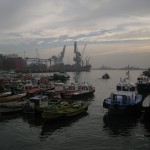this morning i walked around valpo some more, saw some museums, etc. one kinda ridiculous thing they have are ascensores (lifts) speckled throughout the city. each lift is a small carriage on a rail that brings people up and down a hundred meters or so. they’re kinda like san francisco’s cable cars…a definite tourist attraction, but also used by the locals.
i also walked to pablo neruda’s house, which doesn’t look like much from the outside but is very interesting from the inside. each floor is pretty small (big enough for 2-3 rooms)…but he occupied 4 floors. the interior decoration is interesting…although it can be a bit much…a bit tacky, at times. but the views from the house are incredible.
from there, i drove about 10 min north to vino del mar…which is kinda like the la jolla of this area. it’s sunny, beautiful ocean and full of nice restaurants/houses. in particular, there are a few ridiculous estates. one, castillo wulff, is a castle-like building on the rocky ocean beach. another 100 year old estate is the palacio rioja, which is instead in the style of neo-classic french. both are beautiful and exotic. there’s also the presidential palace (…a bit like camp david, i think) and a number of other cool places. according to the security guard of the presidential palace, the neighboring house (still a nice neighborhood but not with the same incredible view of the ocean) rents for about 1.5k/month.
labor is cheap in latin america…and it has some pretty significant impacts on the culture here. for instance, today, i saw a man walkng around a residential neighborhood selling brooms. granted, brooms may be in higher demand here (owners are more responsible for sweeping their sidewalks than in the us…plus, people and dogs dirty the sidewalk more often here)…but still, selling brooms door to door can’t result in huge profits. the bigger, implications, though, have to do with the use of products and in technology development. for instance, most things here are full-service….from laundry to gas to photocopies. it’s partly that customers enjoy the full-service experience, but probably more due to the relative cost of labor and equipment — it’s cheaper to hire somebody trained to make photocopies than to risk having the copier broken in a self-service environment. with such cheap labor, automation and artificial intelligence aren’t as necessary either. a vending machine is more expensive to operate here than a person selling candy on the side of the road. in fact, i bet many fewer houses having dishwashers here, even among those who can afford them. another huge market segment that is ignored is making existing technologies easier/faster….in the us, time is money, but here…time is, well, time. at my last company, the major selling point for our products (that was stressed to hospitals) is that our devices made their procedures faster….which is important when each minute in the operating room can cost as much as $60. here, the bigger selling point would be if the product could be (safely) reused multiple times…even if it was harder to use than competing tools. it seems like the major innovations here involve increasing the quantity of services or making the existing product cheaper to operate (electricity, replacement parts, etc….minus labor). for instance, some markets in peru now allow the stands to share a single credit card machine…thus allowing the stands to accept credit cards. i noticed another example in ecuador, when i had an inner tube placed in my tire (the side walls were badly damaged). because tires are so expensive, they’re used until there’s no rubber left. they’ll patch and patch them. right now, they use old rubber tires, rubber cement and inner tubes to patch the damaged tire….you’d think this might be a place for innovation: maybe a nifty little tool/part which could allow anyone to patch a tire easily, consistently and in just a few minutes (like the tire plug kits they sell in the states). well, here, mechanics tend to take pride in their work (kind of an old-school mentality….i can do it better than a machine can) and they would rather spend an extra couple hours and save a few bucks. that’s also partly because in many industries there is much more competition than customers, so they really do have free time. i wonder if it’s a hard cycle to get out of….cheap labor. anyway, just a ramblng thought.



